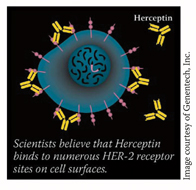
Trastuzumab/Chemo Improves Disease-Free Survival in Early-Stage Breast Cancer
The combination of the targeted agent trastuzumab (Herceptin) and standard chemotherapy cuts the risk of HER-2-positive breast cancer recurrence by more than half compared with chemotherapy alone, the National Cancer Institute (NCI) announced yesterday. The result comes from two large, NCI-sponsored, randomized trials testing, as adjuvant therapy, a trastuzumab/chemotherapy combination against chemotherapy alone in women with invasive, early stage, HER-2 positive breast cancer.
 The Data Monitoring Committees (DMC) overseeing the trials' combined analysis recommended that the results of a recent, combined interim analysis be made public because the studies had met their primary endpoint of increasing disease-free survival in patients receiving combination therapy. There was also a statistically significant improvement in overall survival with the trastuzumab/chemotherapy combination.
The Data Monitoring Committees (DMC) overseeing the trials' combined analysis recommended that the results of a recent, combined interim analysis be made public because the studies had met their primary endpoint of increasing disease-free survival in patients receiving combination therapy. There was also a statistically significant improvement in overall survival with the trastuzumab/chemotherapy combination.
"For women with this type of aggressive breast cancer, the addition of trastuzumab to chemotherapy appears to virtually reverse prognosis from unfavorable to good," says Dr. Edward Romond, study chair for one of the two trials led by the National Surgical Adjuvant Breast and Bowel Project (NSABP).
"These findings confirm that we now have a very potent weapon against the recurrence of cancer cells that overexpress HER-2," adds Dr. Edith A. Perez, who chaired the other trial, led by the North Central Cancer Treatment Group (NCCTG).
Trastuzumab, manufactured by Genentech, Inc., specifically targets the HER-2 protein, which is overexpressed in approximately 20 to 30 percent of breast cancers. HER-2-positive tumors are not only more aggressive than tumors that do not overproduce HER-2, they also are more likely to recur. Trastuzumab is approved by the FDA for use in women with HER-2 positive metastatic breast cancer. According to Dr. JoAnne Zujewski, of NCI's Cancer Therapy Evaluation Program, these are the first trials to show a benefit for trastuzumab as breast cancer adjuvant therapy.
The DMC's interim analysis included data on 3,300 of the 5,000 patients enrolled in the trials. Participants - all of whom had small tumors removed surgically with or without radiation - were enrolled in the trials between February 2000 and April 2005. Patients were randomized to receive a regimen of doxorubicin and cyclophosphamide followed by paclitaxel, or doxorubicin and cyclophosphamide followed by paclitaxel and trastuzumab. Most patients' cancer had spread to the lymph nodes.
"Even those who anticipated a positive result from these trials will be surprised at the magnitude of the finding - a 52-percent decrease in disease recurrence," says Dr. Zujewski. "That's a significant difference that is rarely seen in a clinical trial."
Additional analyses will allow the trial leaders to perform a more thorough risk/benefit analysis. In the interim analysis, the likelihood of congestive heart failure (CHF) in women receiving the trastuzumab/chemotherapy combination was increased by 3 to 4 percent, compared with a less than 1 percent CHF rate in those treated with chemotherapy alone.
By Carmen Phillips
|